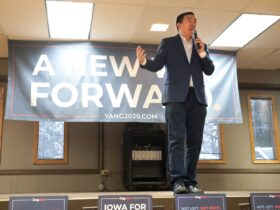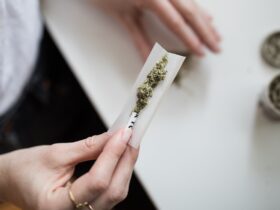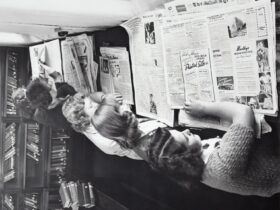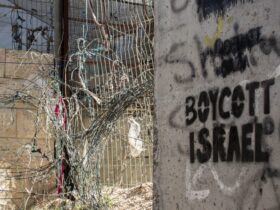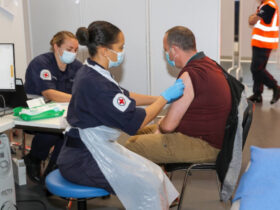In the first episode of the new season of HBO’s Curb Your Enthusiasm, Larry David’s fellow comedian Albert Brooks holds a “living funeral” for himself so that he can enjoy the fawning eulogies offered up by his celebrity friends. Brooks’s plan goes awry, however, when Larry wanders around Brooks’s home in search of a bathroom and stumbles into a closet crammed with hand sanitizer, N-95 masks, and toilet paper. “Albert Brooks is a Covid hoarder!” shouts Larry. The affluent Hollywood types in attendance assemble into an angry mob and denounce the erstwhile honoree. (“First responders could’ve used all that stuff!” shouts Jon Hamm.)
The scene dredges up a nearly forgotten theme of the early days of the pandemic—the days when toilet paper aisles stood empty and rural conservatives stockpiled masks—but it also depicts an ongoing social trend. The pandemic has provided residents of the tony enclaves of coastal metropolitan regions with endless opportunities for performative displays of public spiritedness, which often tip over into hectoring and scapegoating. Their standard targets, though, are not “Covid hoarders,” but the unwashed masses who refuse to mask and vaxx.
Other than the Brooks incident, the moral grandstanding that is a constant of Covid-era liberal culture is absent from Curb. That’s because the new season takes place in a fantastical Los Angeles where Covid appears to be relegated fully to the past. The only masks we catch sight of are the ones in boxes in Brooks’s closet—a far cry from actual present-day Los Angeles, where masks have been mandated indoors ever since last summer’s Delta surge. Likewise, at no point in the season does a character need to present proof of vaccination to enter a restaurant, or take a rapid test prior to attending a social gathering.
David told one interviewer that all of this was a deliberate choice: “I didn’t want everybody walking around with masks on and social distancing and things like that. I don’t think it would have been funny.” However, it is not only creators of comedy shows who have chosen to set their stories in a blissfully Covid-free world: a wide range of hit streaming series, from Ted Lasso to White Lotus to Succession, have kept their storylines uncontaminated by the virus and, more importantly, its broader social fallout. Major Hollywood films released lately have done the same.
“This divergence between the real world and its televised simulacrum hints at a disavowed discomfort with the transformations of social life imposed in the past two years.”
To sustain a simulacrum of Los Angeles where humor could flow unimpeded by the quotidian indignities of life under Covid, the makers of Curb evidently imposed strict regulations on the filming site, cast, and crew. This much is apparent from various staff positions on the show’s production team: the credits include the names of “Covid Compliance Supervisors,” “PPE Production Assistants,” and various other staffers charged with cordoning off the cast and crew from virus-related disruptions. A more drastic approach is that of “Covid bottle shows” like White Lotus, filmed in a remote location, with actors confined there for the duration of the shoot.
Studio sets are not the only hygienic bubbles that have lately proliferated in blue-state enclaves. Elite universities have also built up their own ad hoc public health apparatus to project an aura of safety while continuing to fill dormitories and rake in tuition dollars. But unlike the miraculously virus-free fictional worlds being conjured up on the screen, life on many campuses is far more locked down than it is in the surrounding communities. Despite an expanding regime of mandates that now include booster shots and N-95 masks, many elite schools have returned to remote instruction, mandatory weekly testing, and other measures. Some have even quarantined students in dorms and forbidden social interaction—even as restaurants, bars and clubs in adjacent neighborhoods, towns, and cities remain open (at least to the vaccinated).
While hermetically sealed television and movie studios enable the relaxation of restrictions in the imaginary worlds they fabricate, the similar cordoning off of educational institutions has only led to a further ramping up of restrictions within them. It would seem that the affluent demographic that creates and consumes prestige television and sends its children to elite colleges prefers to consume fictions that contrast with the restrictive environments it has demanded in reality.
In general, however, those who defend such measures also deny their harshness. As Kat Rosenfield observed recently, “an interesting argument has emerged among certain members of the chattering class—one where . . . [t]o mention the notion of returning to normal is to be met with incredulity: ‘What do you mean, “back to normal”?! We’re already there!’” Yet those who insist that covering faces and regulating access to public spaces by vaccination status are no big deal prefer, at least for now, not to have these novel realities represented on screen.
This divergence between the real world and its televised simulacrum hints at a disavowed discomfort with the transformations of social life imposed in the past two years. Perhaps representing the realities of contemporary life in Los Angeles and New York City back to their denizens as entertainment would make the dystopian character of, for instance, minimum wage workers being charged with enforcement of public health measures that in effect exclude much of the disproportionately unvaccinated working class from public life too evident. At minimum, the preference for unmasked entertainment is a tacit admission of a point often denied by advocates of strict Covid measures: the concealment of the human face carries a cost.
Like Albert Brooks in the new Curb, our elite urban professionals are hoarders—but not of Covid supplies—and like him, they seem to want nothing so much as to bask in the praise of their peers. As Catherine Liu argues, they are “virtue hoarders,” and the politics of the pandemic has functioned as a means of reaffirming their moral self-regard. “Staying home,” an option most likely to be available to those with white-collar jobs that could be easily made remote, became an occasion for trumpeting one’s devotion to the public good; vaccination passes, higher rates of which also happen to correlate heavily with higher class status, serve the same function.
An even vaguely realistic representation of the current cityscapes of Los Angeles, New York, and other coastal enclaves would show an uglier picture: ubiquitous TSA-style security theater, the biopolitical reinforcement of class stratification, and a culture of fear, blame, and scapegoating. On the other hand, contrary to Larry David’s interview remark, there is a modicum of dark humor to be found in this situation, as his “Covid hoarder” scene hints at: both Albert Brooks’s fragile vanity and the vindictive self-righteousness of the mob that descends upon him are reminiscent of the qualities the pandemic has consistently brought out in our elites. But as with Brooks when his faux funeral turns sour, this isn’t a spectacle they much want to see reflected back at them.

